鲁教版(五四制)九年级全册Unit 5 You’re supposed to shake hands. Section B 1a~2e课件(共25张PPT)
文档属性
| 名称 | 鲁教版(五四制)九年级全册Unit 5 You’re supposed to shake hands. Section B 1a~2e课件(共25张PPT) |
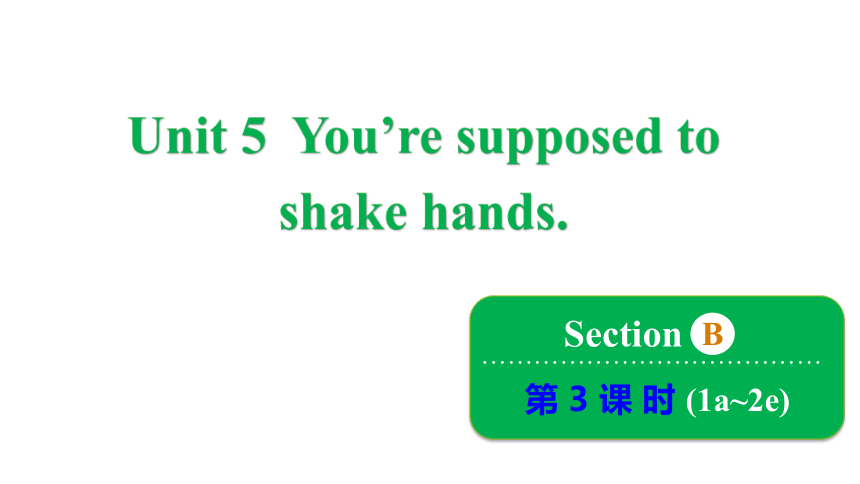
|
|
| 格式 | pptx | ||
| 文件大小 | 1.0MB | ||
| 资源类型 | 教案 | ||
| 版本资源 | 鲁教版 | ||
| 科目 | 英语 | ||
| 更新时间 | 2024-05-03 00:04:12 | ||
图片预览

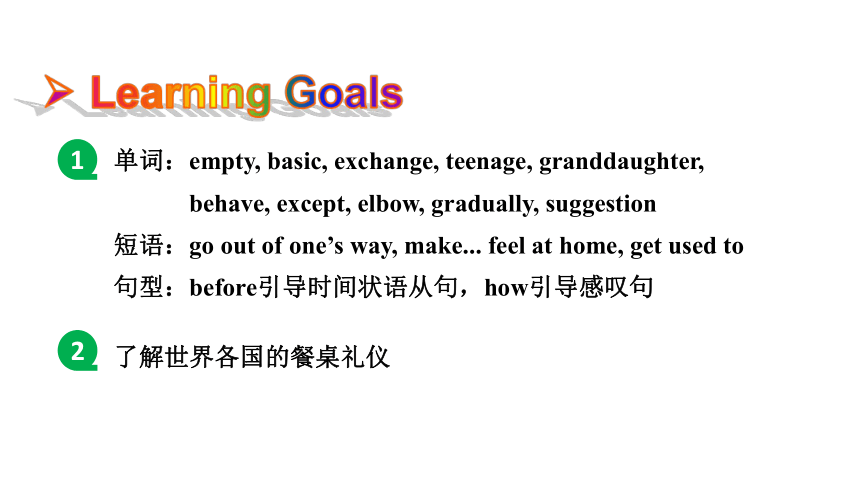
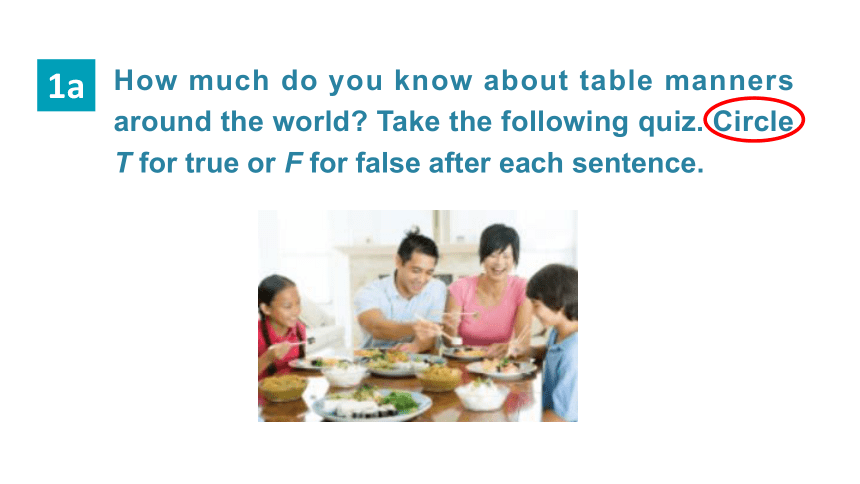
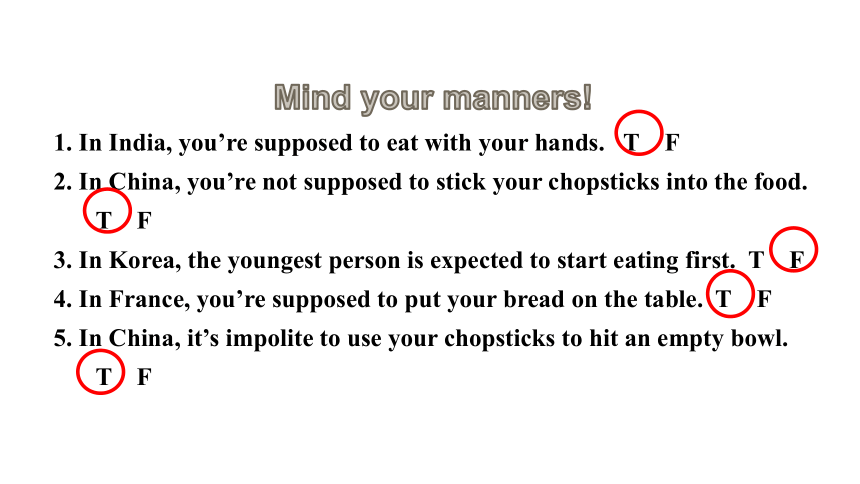
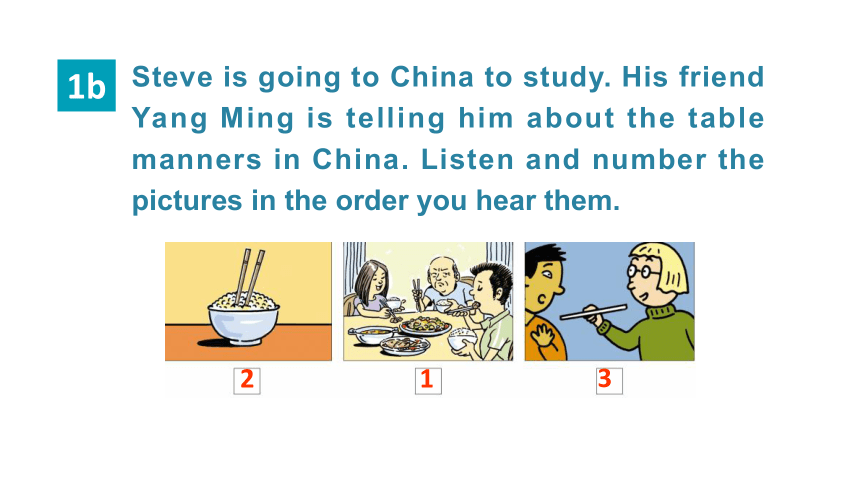
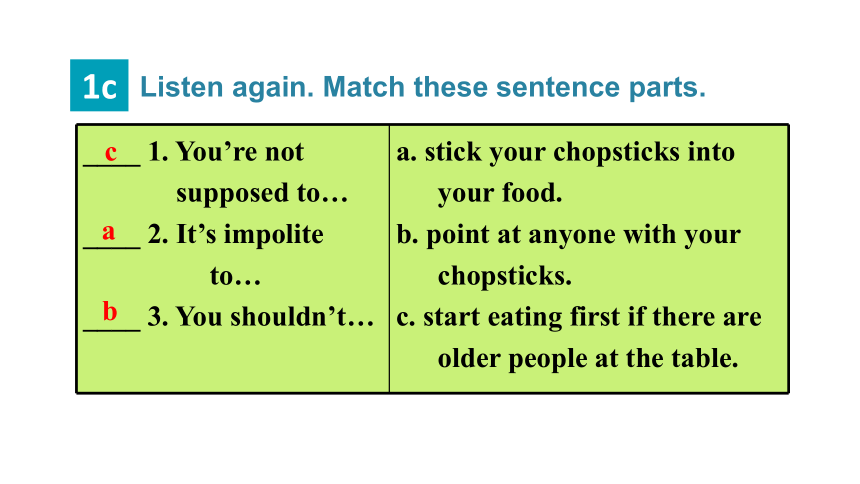

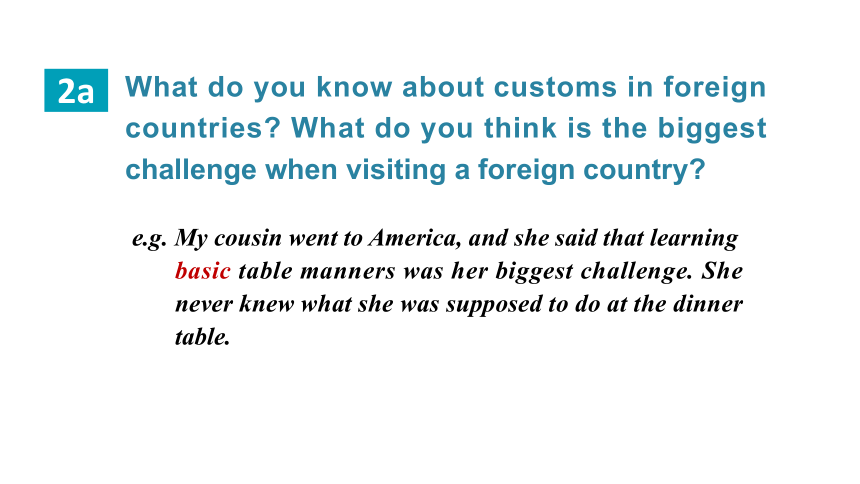
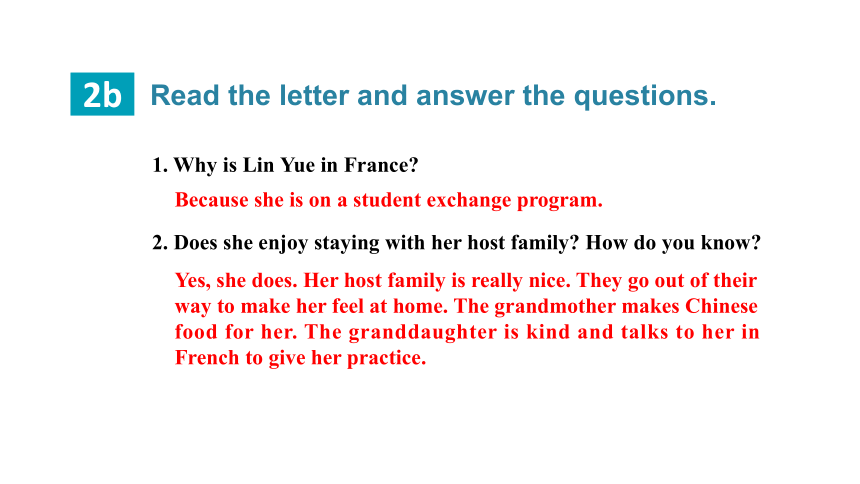
文档简介
(共25张PPT)
Section
第 3 课 时 (1a~2e)
…………………………………
B
Unit 5 You’re supposed to shake hands.
Learning Goals
1
单词:empty, basic, exchange, teenage, granddaughter,
behave, except, elbow, gradually, suggestion
短语:go out of one’s way, make... feel at home, get used to
句型:before引导时间状语从句,how引导感叹句
了解世界各国的餐桌礼仪
2
How much do you know about table manners around the world Take the following quiz. Circle T for true or F for false after each sentence.
1a
Mind your manners!
1. In India, you’re supposed to eat with your hands. T F
2. In China, you’re not supposed to stick your chopsticks into the food. T F
3. In Korea, the youngest person is expected to start eating first. T F
4. In France, you’re supposed to put your bread on the table. T F
5. In China, it’s impolite to use your chopsticks to hit an empty bowl. T F
1
2
3
1b
Steve is going to China to study. His friend Yang Ming is telling him about the table manners in China. Listen and number the pictures in the order you hear them.
Listen again. Match these sentence parts.
____ 1. You’re not supposed to… ____ 2. It’s impolite to… ____ 3. You shouldn’t… a. stick your chopsticks into your food.
b. point at anyone with your chopsticks.
c. start eating first if there are older people at the table.
a
c
b
1c
Talk about other table manners in your country.
We’re supposed to...
Yes, and it’s impolite to...
1d
What do you know about customs in foreign countries What do you think is the biggest challenge when visiting a foreign country
e.g. My cousin went to America, and she said that learning basic table manners was her biggest challenge. She never knew what she was supposed to do at the dinner table.
2a
Read the letter and answer the questions.
1. Why is Lin Yue in France
2. Does she enjoy staying with her host family How do you know
Because she is on a student exchange program.
Yes, she does. Her host family is really nice. They go out of their way to make her feel at home. The grandmother makes Chinese food for her. The granddaughter is kind and talks to her in French to give her practice.
2b
3. How does she feel about making mistakes when she speaks
French
4. What is the biggest challenge she is facing
It doesn’t worry her as it used to.
The biggest challenge is learning how to behave at the dinner table.
REVIEWING
Taking notes or summarizing the main ideas can help you move language from your short-term to long-term memory.
Dear Laura,
Thanks for your message. Yes, I’m having a great time on my student exchange program in France. I was a bit nervous before I arrived here, but there was no reason to be. My host family is really nice. They go out of their way to make me feel at home. The grandmother knows that I miss Chinese food a lot. So she actually learned how to make Chinese food! She also has a teenage granddaughter about my age who is really kind. She always talks to me in French to help me practice. You wouldn’t believe how quickly my French has improved because of that. I’m very comfortable speaking French now. Although I still make lots of mistakes, it doesn’t worry me as it used to.
My biggest challenge is learning how to behave at the dinner table. As you can imagine, things are very different from the way they are at home. For example, you’re not supposed to put your bread on your plate. You’re supposed to put it on the table! I thought that was pretty strange at first, but now I’m used to it. Another example is that you’re not supposed to eat anything with your hands except bread, not even fruit. You have to cut it up and eat it with a fork. Another thing is that it is impolite to say you’re full. If you don’t want any more food, you should just say, “That was delicious.” Also, you’re not supposed to put your elbows on the table. I have to say that I find it difficult to remember everything, but I’m gradually getting used to it. I don’t find French customs so strange anymore.
I’ll write again soon and tell you more about my life in France. Hope you’re having a good school year.
Yours,
Lin Yue
I was a bit nervous before I arrived here, but there was no reason to be. 我来这里之前还有点儿紧张,但是没有理由那样。
这是一个由but连接的并列句,在前一个分句中有一个before引导的时间状语从句。there was no reason to be后面省略了nervous,以避免重复。
there is/was no reason to do sth.意为“没有理由做某事”。
※ There is no reason to panic. 没有理由惊慌。
Language points
2. They go out of their way to make me feel at home. 他们尽力让我感觉像在家里一样。
go out of one’s way意为“特地;格外努力”。
※ They go out of their way to help me. 他们特地帮助我。
make sb. feel at home意为“使某人感到宾至如归”。
※ Her parents are friendly to me. This makes me feel at home. 她父母对我很好,这使我感到像在自己家里一样。
3. You wouldn’t believe how quickly my French has improved because of that. 你不会相信我的法语因此进步多快。
句中how...improved为感叹句,作believe的宾语。
because of意为“因为;由于”。
※ They didn’t go to the park because of the rain.
※ They didn’t go to the park because it rained.
because of 为介词短语,其后一般跟名词、代词或名词性的短语
because 为连词,通常用来回答why提出的疑问,后跟原因状语从句
4. Another example is that you’re not supposed to eat anything with your hands except bread, not even fruit. 另一个例子是,除了面包外,你不应该用手拿着吃任何东西,甚至水果也不行。
except作介词,意为“除……之外”,后跟名词、介词短语、不定式或that从句等。
※They all went to sleep except me. 除我之外,他们都去睡觉了。
※ She has no relatives besides an aged aunt.
她除了有一位年老的姑姑以外,再没有亲戚了。
except 表示“除了”,即except 后的人或物被排除在外
besides 表示“除……之外还有”,即besides 后的人或物也包括在前面提到的范围内
5. I have to say that I find it difficult to remember everything, but I’m gradually getting used to it. 我不得不承认,要记住所有的事情很难,但是我渐渐地习惯了。
find it difficult to do sth.意为“发现做某事很困难”。
※I find it difficult to catch up with others.
我发现要赶上别人很难。
gradually作副词,意为“逐步地;逐渐地”。
※Nowadays, many old customs are gradually dying out.
当今,许多旧风俗正在逐渐消失。
get/be used 意为“习惯于”,后跟名词、代词或动名词。
※He gets/is used to living there. 他习惯于住在那里。
1. Making mistakes in French used to make Lin Yue nervous.
2. It was quite hard for her to feel good about speaking French.
3. The host family tried very hard to help Lin Yue.
4. Lin Yue has slowly learned how to be like her French friends.
Read the sentences and replace the underlined words with the phrases in the box.
went out of their way
be comfortable (doing)
gradually gotten used to being
(something) worry (someone)
2c
Review the passage and make notes about French customs in the chart.
Dos Don’ts
You’re expected to put your bread on the table. You’re not supposed to put your bread on your plate.
You’re expected to cut up your fruit and eat it with a fork.
You’re not supposed to eat anything with your hands except bread.
You’re expected to say “That was delicious” if you don’t want any more food.
You’re not supposed to say you’re full.
You’re not supposed to put your elbows on the table.
2d
Compare the table manners in France and China in your group. How are they the same or different Make a list.
2e
In France, people put their bread on the table. But in China, we always put our food on a plate or in a bowl. We never put food on the table.
In France, people cut the fruit up and eat it with a fork. But in China, we …
In France, people don’t put their elbows on the table.
But in China, we…
I.用括号中所给词的适当形式填空
1. They go out of their way to________ (perform) well.
2. My father used to ________ (watch) TV after supper, but now he is used to ________(take) a walk.
3. Our English teacher is humorous. He often makes us
________(laugh) at class.
4. His health is ________(gradual) improving.
perform
watch
laugh
gradually
taking
Practice
Ⅱ.根据句意,选择恰当的词语填空
1. Listen! Someone is ____________ the door.
2. There is nothing in the box. It’s _______.
3. It’s _________ to speak loudly at the restaurant.
4. Don’t _____ your fork ____ the food.
5. The baby _______ to cry as soon as the mother left.
6. You shouldn’t _________ others with your finger.
knocking at
empty
point at stick…into empty start knock at impolite
impolite
into
started
stick
point at
Ⅲ.单项选择
1. To celebrate the New Year, almost everyone performed _________ the shy girl. She just sat in the corner quietly.
A. except B. against C. with D. besides
2. (绥化中考) Miss. Li likes swimming very much and now she ________ on Saturday afternoon.
A. used to swim B. is used to swim C. is used to swimming
3. We find ________ difficult to finish the work on time.
A. it B. that C. this D. what
4. They go out _________ their way to make me _______ at home.
A. for; feel B. of; to feel C. to; feels D. of; feel
Ⅳ.将下列句子翻译成英语
1. 你没有理由生气。
2. 我们发现很难走出这片森林。
3. 我现在习惯在睡觉前看书。
There is no reason for you to be angry.
We find/found it difficult to go out of the forest.
I am/get used to reading before sleeping.
Section
第 3 课 时 (1a~2e)
…………………………………
B
Unit 5 You’re supposed to shake hands.
Learning Goals
1
单词:empty, basic, exchange, teenage, granddaughter,
behave, except, elbow, gradually, suggestion
短语:go out of one’s way, make... feel at home, get used to
句型:before引导时间状语从句,how引导感叹句
了解世界各国的餐桌礼仪
2
How much do you know about table manners around the world Take the following quiz. Circle T for true or F for false after each sentence.
1a
Mind your manners!
1. In India, you’re supposed to eat with your hands. T F
2. In China, you’re not supposed to stick your chopsticks into the food. T F
3. In Korea, the youngest person is expected to start eating first. T F
4. In France, you’re supposed to put your bread on the table. T F
5. In China, it’s impolite to use your chopsticks to hit an empty bowl. T F
1
2
3
1b
Steve is going to China to study. His friend Yang Ming is telling him about the table manners in China. Listen and number the pictures in the order you hear them.
Listen again. Match these sentence parts.
____ 1. You’re not supposed to… ____ 2. It’s impolite to… ____ 3. You shouldn’t… a. stick your chopsticks into your food.
b. point at anyone with your chopsticks.
c. start eating first if there are older people at the table.
a
c
b
1c
Talk about other table manners in your country.
We’re supposed to...
Yes, and it’s impolite to...
1d
What do you know about customs in foreign countries What do you think is the biggest challenge when visiting a foreign country
e.g. My cousin went to America, and she said that learning basic table manners was her biggest challenge. She never knew what she was supposed to do at the dinner table.
2a
Read the letter and answer the questions.
1. Why is Lin Yue in France
2. Does she enjoy staying with her host family How do you know
Because she is on a student exchange program.
Yes, she does. Her host family is really nice. They go out of their way to make her feel at home. The grandmother makes Chinese food for her. The granddaughter is kind and talks to her in French to give her practice.
2b
3. How does she feel about making mistakes when she speaks
French
4. What is the biggest challenge she is facing
It doesn’t worry her as it used to.
The biggest challenge is learning how to behave at the dinner table.
REVIEWING
Taking notes or summarizing the main ideas can help you move language from your short-term to long-term memory.
Dear Laura,
Thanks for your message. Yes, I’m having a great time on my student exchange program in France. I was a bit nervous before I arrived here, but there was no reason to be. My host family is really nice. They go out of their way to make me feel at home. The grandmother knows that I miss Chinese food a lot. So she actually learned how to make Chinese food! She also has a teenage granddaughter about my age who is really kind. She always talks to me in French to help me practice. You wouldn’t believe how quickly my French has improved because of that. I’m very comfortable speaking French now. Although I still make lots of mistakes, it doesn’t worry me as it used to.
My biggest challenge is learning how to behave at the dinner table. As you can imagine, things are very different from the way they are at home. For example, you’re not supposed to put your bread on your plate. You’re supposed to put it on the table! I thought that was pretty strange at first, but now I’m used to it. Another example is that you’re not supposed to eat anything with your hands except bread, not even fruit. You have to cut it up and eat it with a fork. Another thing is that it is impolite to say you’re full. If you don’t want any more food, you should just say, “That was delicious.” Also, you’re not supposed to put your elbows on the table. I have to say that I find it difficult to remember everything, but I’m gradually getting used to it. I don’t find French customs so strange anymore.
I’ll write again soon and tell you more about my life in France. Hope you’re having a good school year.
Yours,
Lin Yue
I was a bit nervous before I arrived here, but there was no reason to be. 我来这里之前还有点儿紧张,但是没有理由那样。
这是一个由but连接的并列句,在前一个分句中有一个before引导的时间状语从句。there was no reason to be后面省略了nervous,以避免重复。
there is/was no reason to do sth.意为“没有理由做某事”。
※ There is no reason to panic. 没有理由惊慌。
Language points
2. They go out of their way to make me feel at home. 他们尽力让我感觉像在家里一样。
go out of one’s way意为“特地;格外努力”。
※ They go out of their way to help me. 他们特地帮助我。
make sb. feel at home意为“使某人感到宾至如归”。
※ Her parents are friendly to me. This makes me feel at home. 她父母对我很好,这使我感到像在自己家里一样。
3. You wouldn’t believe how quickly my French has improved because of that. 你不会相信我的法语因此进步多快。
句中how...improved为感叹句,作believe的宾语。
because of意为“因为;由于”。
※ They didn’t go to the park because of the rain.
※ They didn’t go to the park because it rained.
because of 为介词短语,其后一般跟名词、代词或名词性的短语
because 为连词,通常用来回答why提出的疑问,后跟原因状语从句
4. Another example is that you’re not supposed to eat anything with your hands except bread, not even fruit. 另一个例子是,除了面包外,你不应该用手拿着吃任何东西,甚至水果也不行。
except作介词,意为“除……之外”,后跟名词、介词短语、不定式或that从句等。
※They all went to sleep except me. 除我之外,他们都去睡觉了。
※ She has no relatives besides an aged aunt.
她除了有一位年老的姑姑以外,再没有亲戚了。
except 表示“除了”,即except 后的人或物被排除在外
besides 表示“除……之外还有”,即besides 后的人或物也包括在前面提到的范围内
5. I have to say that I find it difficult to remember everything, but I’m gradually getting used to it. 我不得不承认,要记住所有的事情很难,但是我渐渐地习惯了。
find it difficult to do sth.意为“发现做某事很困难”。
※I find it difficult to catch up with others.
我发现要赶上别人很难。
gradually作副词,意为“逐步地;逐渐地”。
※Nowadays, many old customs are gradually dying out.
当今,许多旧风俗正在逐渐消失。
get/be used 意为“习惯于”,后跟名词、代词或动名词。
※He gets/is used to living there. 他习惯于住在那里。
1. Making mistakes in French used to make Lin Yue nervous.
2. It was quite hard for her to feel good about speaking French.
3. The host family tried very hard to help Lin Yue.
4. Lin Yue has slowly learned how to be like her French friends.
Read the sentences and replace the underlined words with the phrases in the box.
went out of their way
be comfortable (doing)
gradually gotten used to being
(something) worry (someone)
2c
Review the passage and make notes about French customs in the chart.
Dos Don’ts
You’re expected to put your bread on the table. You’re not supposed to put your bread on your plate.
You’re expected to cut up your fruit and eat it with a fork.
You’re not supposed to eat anything with your hands except bread.
You’re expected to say “That was delicious” if you don’t want any more food.
You’re not supposed to say you’re full.
You’re not supposed to put your elbows on the table.
2d
Compare the table manners in France and China in your group. How are they the same or different Make a list.
2e
In France, people put their bread on the table. But in China, we always put our food on a plate or in a bowl. We never put food on the table.
In France, people cut the fruit up and eat it with a fork. But in China, we …
In France, people don’t put their elbows on the table.
But in China, we…
I.用括号中所给词的适当形式填空
1. They go out of their way to________ (perform) well.
2. My father used to ________ (watch) TV after supper, but now he is used to ________(take) a walk.
3. Our English teacher is humorous. He often makes us
________(laugh) at class.
4. His health is ________(gradual) improving.
perform
watch
laugh
gradually
taking
Practice
Ⅱ.根据句意,选择恰当的词语填空
1. Listen! Someone is ____________ the door.
2. There is nothing in the box. It’s _______.
3. It’s _________ to speak loudly at the restaurant.
4. Don’t _____ your fork ____ the food.
5. The baby _______ to cry as soon as the mother left.
6. You shouldn’t _________ others with your finger.
knocking at
empty
point at stick…into empty start knock at impolite
impolite
into
started
stick
point at
Ⅲ.单项选择
1. To celebrate the New Year, almost everyone performed _________ the shy girl. She just sat in the corner quietly.
A. except B. against C. with D. besides
2. (绥化中考) Miss. Li likes swimming very much and now she ________ on Saturday afternoon.
A. used to swim B. is used to swim C. is used to swimming
3. We find ________ difficult to finish the work on time.
A. it B. that C. this D. what
4. They go out _________ their way to make me _______ at home.
A. for; feel B. of; to feel C. to; feels D. of; feel
Ⅳ.将下列句子翻译成英语
1. 你没有理由生气。
2. 我们发现很难走出这片森林。
3. 我现在习惯在睡觉前看书。
There is no reason for you to be angry.
We find/found it difficult to go out of the forest.
I am/get used to reading before sleeping.
同课章节目录
- Unit 1 When was it invented?
- Section A
- Section B
- Unit 2 Teenagers should be allowed to choose their
- Section A
- Section B
- Unit 3 It must belong to Carla.
- Section A
- Section B
- Unit 4 I like music that I can dance to.
- Section A
- Section B
- Unit 5 You’re supposed to shake hands.
- Section A
- Section B
- Unit 6 Sad movies make me cry.
- Section A
- Section B
- Unit 7 Life is full of the unexpected.
- Section A
- Section B
- Unit 8 We're trying to save the earth!
- Section A
- Section B
- Unit 9 It's important to have good habits.
- Section A
- Section B
- Unit 10 I remember meeting all of you in Grade 6.
- Section A
- Section B
